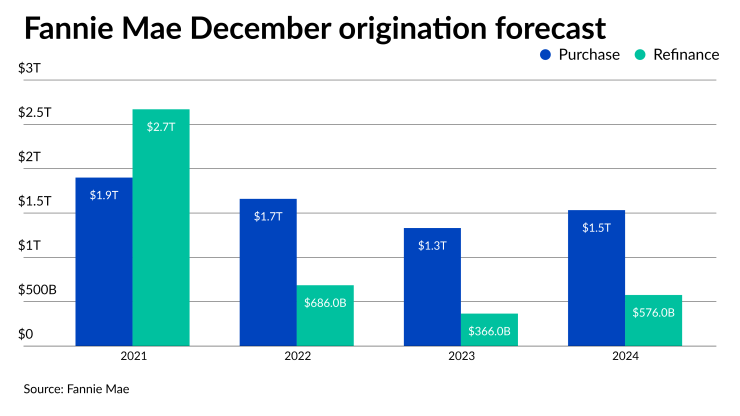The likelihood of a recession drove a reduction in Fannie Mae's mortgage origination forecast for 2023, albeit only by $16 billion.
At the same time, the recent five-week
The U.S. gross domestic product should increase by 0.4% this year, but for 2023, the economy should contract by 0.5%. However, that is a slight improvement over Fannie Mae's
"The economy caught its breath in the second half of 2022, but that doesn't change our expectation that it will run out of air in early 2023 via a mild recession," Doug Duncan, Fannie Mae chief economist, said in a press release. "While uncertainty still exists, a growing set of signs, including an inverted yield curve, weakness in the Conference Board's Leading Economic Index, and a slowdown of manufacturing activity, support our ongoing contention that the economy is likely to contract next year."

Duncan's December forecast calls for $2.346 trillion of originations this year, of which $1.66 trillion will come from purchase activity. This compares with November's $2.339 trillion, with $1.64 trillion from purchases.
That is a big change from Duncan's
"We expect housing to continue to slow, even though mortgage rates have come down recently," Duncan said. Home purchases remain unaffordable for many due to the rapid rise in rates over the last year and the fact that house prices, though certainly slowing and in some places declining, remain elevated compared to pre-pandemic levels."
Those lower rates caused Duncan to upwardly revise his home sales forecast to 5.72 million units in 2022 and 4.57 million units (on a seasonally adjusted annualized rate) in 2023, from 5.67 million and 4.42 million respectively. But this is down from 6.89 million units in 2021.
Home sales dropped 12% month-to-month in November, not just due to seasonality but also fluctuating interest rates and economic uncertainty, according to the Remax National Housing Report.
Balance is returning to the home sales market, meaning buyers and sellers are now able to negotiate, said Nick Bailey, Remax president and CEO, in a press release.
"Things may bounce around a bit longer, especially into the first half of 2023, but it seems like the market is shaking off the last vestiges of the 2021 overheating," Bailey said. "Balance seems to be returning — as it usually does."
Next year, mortgage originators should do $1.696 trillion in volume, consisting of $1.331 trillion of purchases and just $366 billion of refinancings, according to Fannie Mae. Duncan's November outlook of $1.712 trillion of originations included $1.337 trillion in purchase volume and $375 billion of refis.
"Of course, refinancing is still not practical for the vast majority of current mortgage holders, which we expect will also continue to constrain mortgage origination activity," Duncan said.
The Keefe, Bruyette & Woods economic baseline calls for $1.8 trillion in 2023 originations, a research note from Bose George issued on Dec. 14; the report also notes the November Fannie Mae and Mortgage Bankers Association, along with the latest
"If mortgage rates stick around 6% to 7% in 2023, we think there could be downside to industry estimates," George said. KBW's baseline calls for $1.3 trillion of purchase volume in 2023. This will be down 18% over 2022 "and compares to industry groups which are calling for purchase volumes to fall between 5% and 18%," George said.
When it comes to refis, KBW predicts approximately $500 billion, down 35% year-over-year. "We would note that virtually all of the mortgage universe is over 250 basis points out-of-the-money to refinance," George said.
For 2024, Duncan now predicts $2.109 trillion, with $1.533 trillion of purchase. This is a small increase from November's $2.107 trillion of which $1.569 trillion is predicted to come from purchases.




